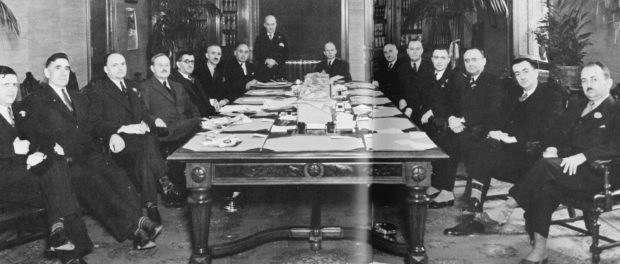1941: Godbout and Conscription & Other Quebec Curios
Part of “Shadows and Revolution”, 1900-1960
 The Godbout cabinet, 1939. Godbout's second term as Premier of Québec and final win against the political giant Duplessis.
The Godbout cabinet, 1939. Godbout's second term as Premier of Québec and final win against the political giant Duplessis.
The issue of conscription, an issue that was almost inherent in the consciousness of many French Canadians, had brought along many consequences: in recent memory, Maurice Duplessis’ snap election that elected Adélard Godbout and the internment the Mayor of Montréal, Camillien Houde. Going further back in time, still in the memories of many French-Canadians, was the conscription of World War I, and further still, the Boer War, a war seen as another manifestation of British imperialism.
By 1941, it was made clear that the Treaty of Munich, proclaimed by then-Prime Minister Neville Chamberlain as being the document that would bring “peace in our time” meant very little to Nazis, who broke their promise not even one year after the signing of the treaty and invaded and occupied Czechoslovakia. Prime Minister Mackenzie King, witness to the the deeds printed all over the newspapers—the Nazi occupation of Poland as well as the invasion of Denmark, and, most recently, the Dunkirk mission and the Battle of Britain—was forced to make a choice. One of Mackenzie King’s election promises was that there would be no conscription: as general support from English Canada rose in favour of conscription, Mackenzie King offered to hold a plebiscite so that the people would permit him to break an election promise and looked to the provinces to support him.
It was not just any province, however, that Mackenzie King wanted: it was Quebec. Adélard Godbout was ready to support the rallying cry for conscription in the 1942 plebiscite, despite the fact that 80% of Quebeckers voted against conscription, the only province to vote overwhelmingly so. Support from Godbout, however, did not come from simple subservience: Godbout, conscious on how the French-Canadians were insulted and demonized by English Canada in the wake of the First World War for speaking their conscience, hoped that the same insult game would not reoccur to his people. His strategical move to try and keep the federal government on Quebec’s side, however, did not go over well with the population, who saw it as another strike against the province’s burgeoning autonomy.
Godbout’s decision to support Prime Minister Mackenzie King, in contrast to Maurice Duplessis and Camillien Houde’s opposition, was seen as once again a Quebec politician’s submission to the federal government, who knew about the ambivalence of the French-Canadian’s ambivalence on fighting someone else’s war but did nothing to quell the situation. In the end, despite the implementation of great social progress, the view of him as a subservient one, the weaker man, in the federal-provincial relations would be his downfall, largely propagated by the Catholic Church and his political opponents. Duplessis, the Leader of the Opposition, made sure to make note of this fault and would use it to his advantage during the next elections.





